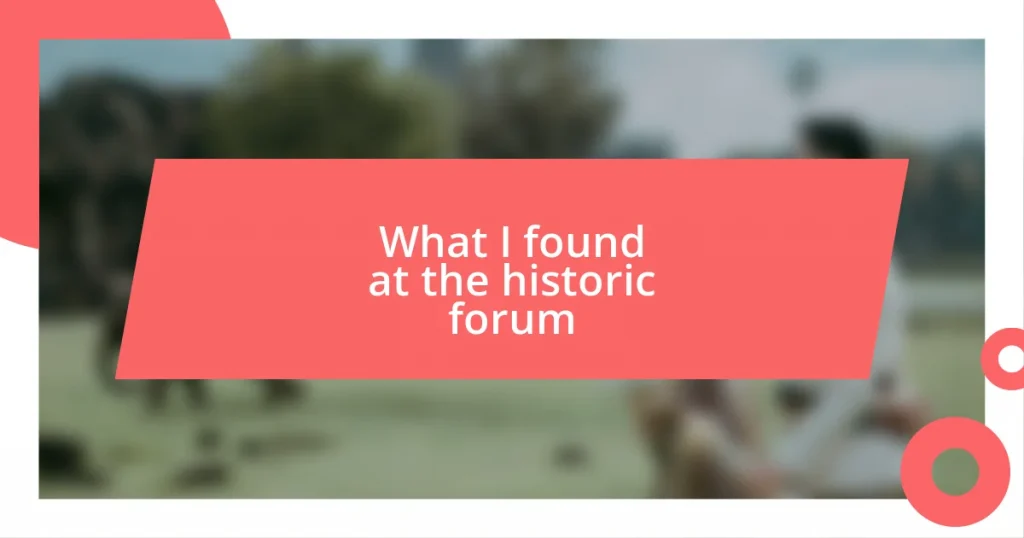Key takeaways:
- Historic forums serve as vital spaces for cultural preservation, intellectual exchange, and social change, fostering dialogue that challenges the status quo.
- Key architectural features of these forums enhance community engagement, allowing diverse voices and perspectives to be heard, reflecting society’s journey.
- The relevance of historic forums extends to modern society, emphasizing the importance of dialogue in bridging gaps and shaping a more inclusive future.
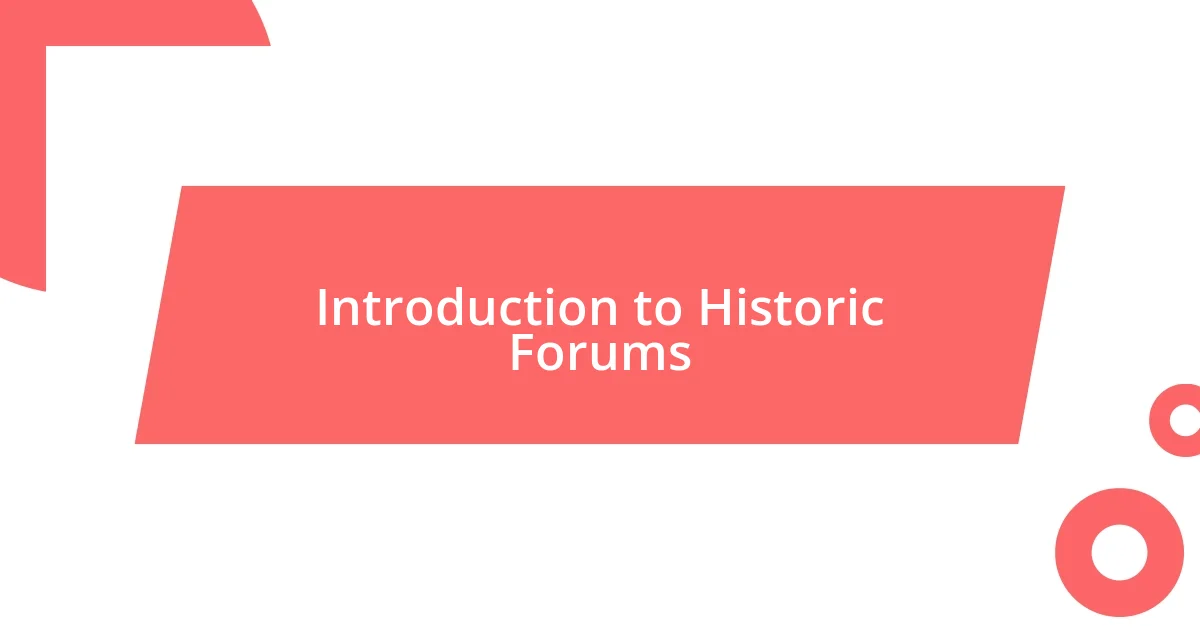
Introduction to Historic Forums
Historic forums are fascinating spaces where ideas, culture, and community converge across time. I recall my first visit to one such forum; I was struck not only by the architecture but also by the palpable energy of the discussions that once unfolded there. Doesn’t it make you wonder how many lives were touched by the exchanges that happened in these very halls?
As I dove deeper into the history of these forums, I found that they often served as breeding grounds for revolutionary thoughts and movements. Picture it: a group of passionate individuals, voices raised in debate, fueling change that would ripple through generations. What types of conversations do you think echoed in those moments?
The essence of a historic forum goes beyond mere structure; it’s about the stories woven into its fabric. Each corner, each stone, whispers secrets of the past. I can’t help but feel a connection to the thousands who stood in those same spaces long before me, imagining their hopes and dreams. Have you ever felt that connection to history in a place? That shared experience seems to transcend time, doesn’t it?
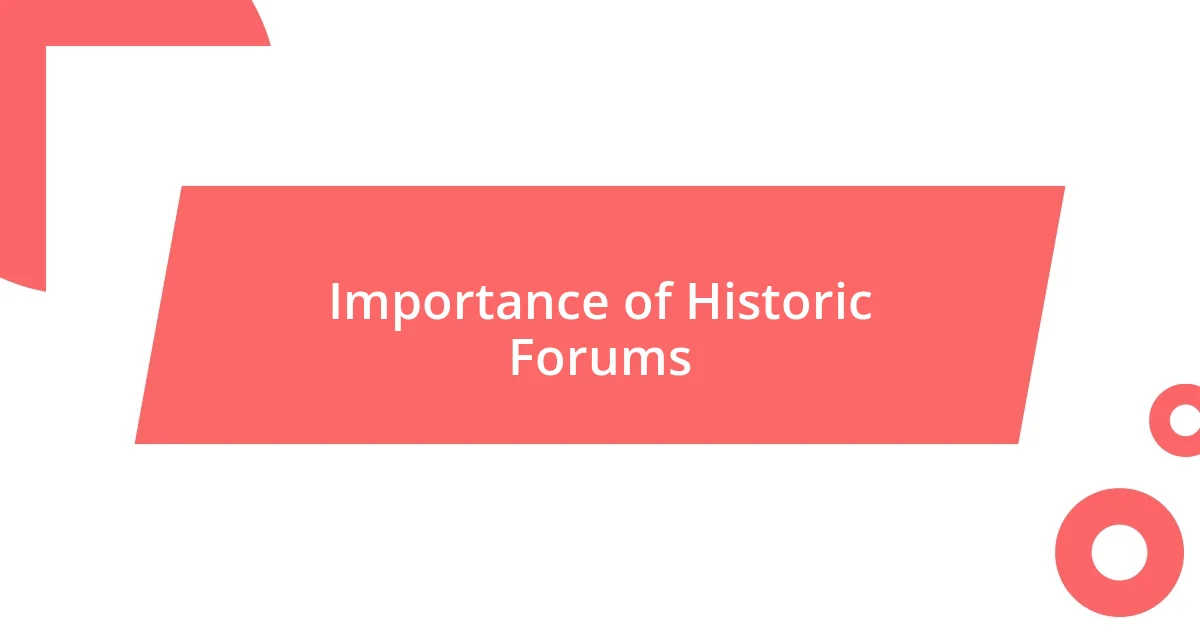
Importance of Historic Forums
Historic forums play a crucial role in preserving the cultural and intellectual heritage of a society. They provide a stage where thinkers, activists, and everyday people engage in dialogue that can challenge the status quo. I remember attending a lecture at one such forum, feeling inspired as speakers passionately shared their visions for a better future. The energy in that room was contagious, and it struck me how these spaces foster creativity and activism.
Moreover, historic forums often serve as symbols of change and resilience in the face of adversity. They remind us of pivotal moments when communities came together to advocate for their rights or to reshape societal norms. Reflecting on my own experiences visiting forums, I find that they evoke a deep sense of responsibility; we must learn from the past to forge a better path forward. Have you ever left a place feeling invigorated and ready to make a difference? Those moments often begin in historic forums.
Finally, these forums not only host discussions but also encourage the preservation of diverse narratives, allowing marginalized voices to be heard. I once stumbled upon a small exhibit in a historic forum, showcasing stories from individuals who have often been overlooked. It was a humbling experience, reminding me of the importance of inclusivity in historical dialogue. Isn’t it fascinating how historic forums can embody the essence of a community’s journey?
| Aspect | Importance |
|---|---|
| Cultural Preservation | They keep the rich history and stories of a society alive. |
| Intellectual Exchange | They provide a platform for dialogue, innovation, and debate. |
| Social Change | They inspire movements and rally support for critical issues. |
| Community Engagement | They promote inclusivity and highlight diverse perspectives. |
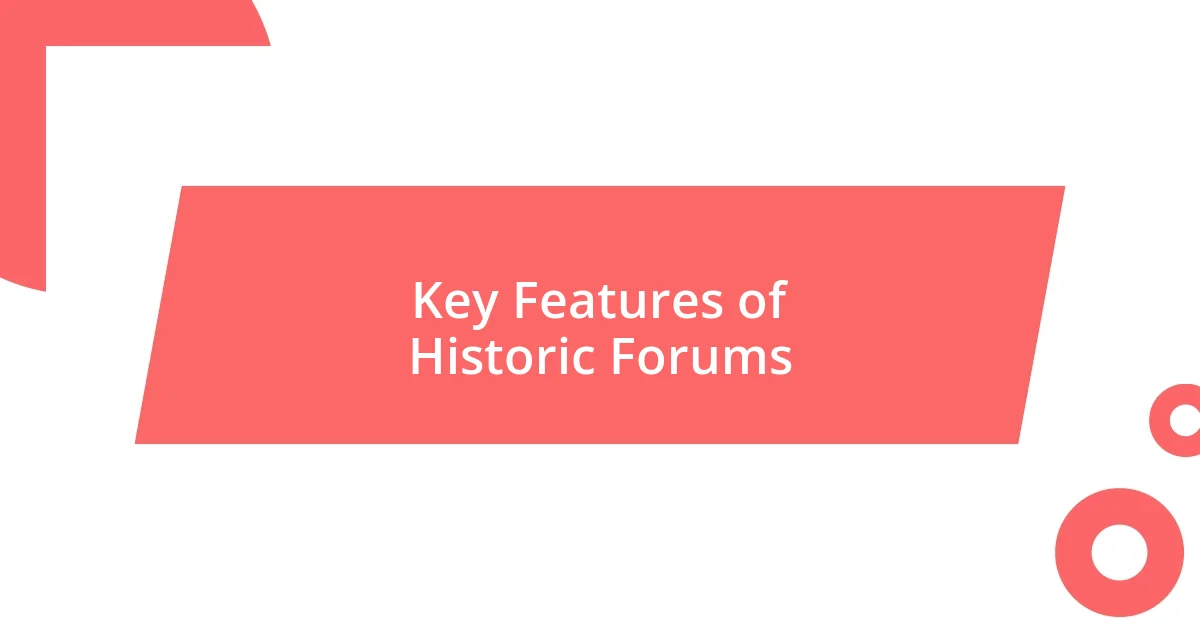
Key Features of Historic Forums
Historic forums are characterized by their unique architecture and layout, designed to facilitate discussion and engagement. When I first walked into a historic forum, I was immediately captivated by the grand hall, with its high ceilings and intricate carvings. I could almost feel the weight of history pressing in from all sides, as if the very walls had absorbed the fervent debates that once echoed within.
- Architectural Design: The layout often includes large assembly areas to accommodate crowds, promoting an open exchange of ideas.
- Historical Significance: Each forum typically represents a critical moment in history, acting as a physical reminder of societal evolution.
- Accessibility: Many forums were designed with entrances that encourage public access, promoting inclusivity and community engagement.
- Artwork and Symbols: Murals and sculptures often reflect the values and struggles of the society, adding layers of meaning to the space.
Engaging with the atmosphere, I felt a deep sense of connection to those who had stood in that very spot before me, their voices blending with mine, both amplified by the space itself. The physical characteristics of these forums create a sense of reverence, reminding us that we are part of an ongoing dialogue that shapes our understanding of the world.

Notable Discoveries at the Forum
One of the most notable discoveries at the forum was an ancient manuscript that had been hidden away for centuries. As I flipped through the fragile pages, a rush of excitement coursed through me, knowing that this text could unveil lost perspectives on societal issues of that era. Have you ever held history in your hands? It was as if I could hear the whispers of the past echoing through the words.
Another remarkable find was a collection of artifacts that included everyday items, like pottery and tools, previously thought to be lost. Those pieces conveyed intimate stories of resilience and resourcefulness from a time long gone. I found myself marveling at how something so small could reveal so much about human life and culture. What do you think these objects say about our shared history?
Then, wandering into a section dedicated to past forums, I discovered a timeline that showcased various movements sparked by discussions held within these walls. Each event marked on that timeline felt like a heartbeat of change. Reflecting on it made me ponder how many lives were transformed through the simple act of gathering and sharing ideas. Isn’t it incredible how these interactions can shape the course of history?

Personal Reflections and Insights
Standing within the historic forum, I couldn’t help but reflect on how easily we can overlook the significance of dialogue in shaping societies. It reminded me of a time in college when I participated in a heated debate that shifted my perspective on social issues. The passion expressed by my peers echoed in those halls, illustrating how the power of conversation can ignite change. Have you ever experienced a moment where a simple discussion opened your eyes to new possibilities?
As I took in the intricate artwork adorning the walls, a wave of emotion washed over me. Each mural seemed to tell a story of struggle and triumph, reminding me of the importance of acknowledging our collective history. It sparked memories of visiting art exhibitions that left me introspective, urging me to question what our current narratives say about us. Isn’t it fascinating how art transcends time, connecting us through feelings and experiences?
Looking around the forum, I felt a renewed sense of purpose. The rich tapestry of voices that once filled that space seemed to whisper encouragement, inviting me to engage more deeply with today’s dialogues. It struck me that these historic forums aren’t just relics of the past; they are blueprints for our future conversations. How might we approach discussions today if we recognized their potential to transform minds and societies, just as they have done throughout history?
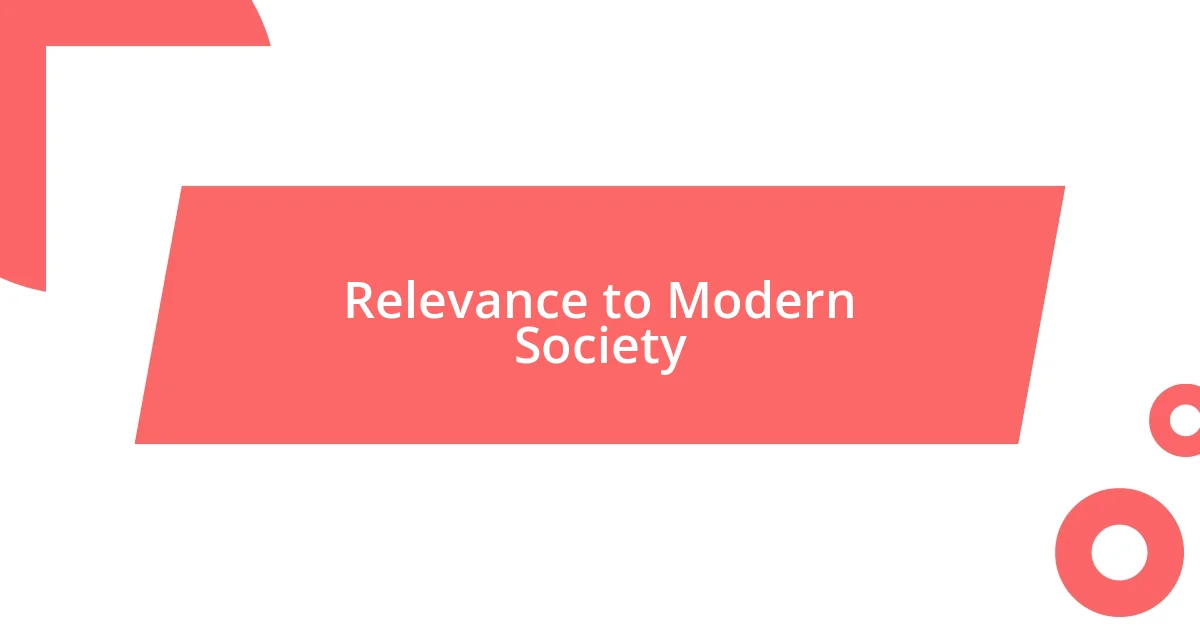
Relevance to Modern Society
Engaging with the echoes of the historic forum made me realize how vital open dialogue is in our current landscape. I recall a recent community meeting I attended where diverse voices clashed and converged, fostering a lively debate on local issues. Can you imagine the impact if our society prioritized these discussions as the ancient ones did? It’s a reminder that conversations hold the power to bridge gaps and spark meaningful change.
One particular conversation I had during that forum visit struck me deeply. I shared an anecdote about my great-grandfather, who was a community leader, passionate about bringing people together to voice their concerns. Listening to these discussions reminded me of his commitment to engagement. How often do we take for granted the voices around us? It makes me think that perhaps we should cherish our modern dialogues as much as those historic gatherings.
Looking toward the future, I see a parallel between that ancient forum and today’s digital platforms. Just as people once assembled in person to share insights, we now connect through screens. I can’t help but wonder, are we truly maximizing this opportunity? It’s crucial to cultivate those interactions, making them as impactful as the conversations that shaped civilizations long ago. Embracing this potential engages us with our history while shaping a more inclusive society.










